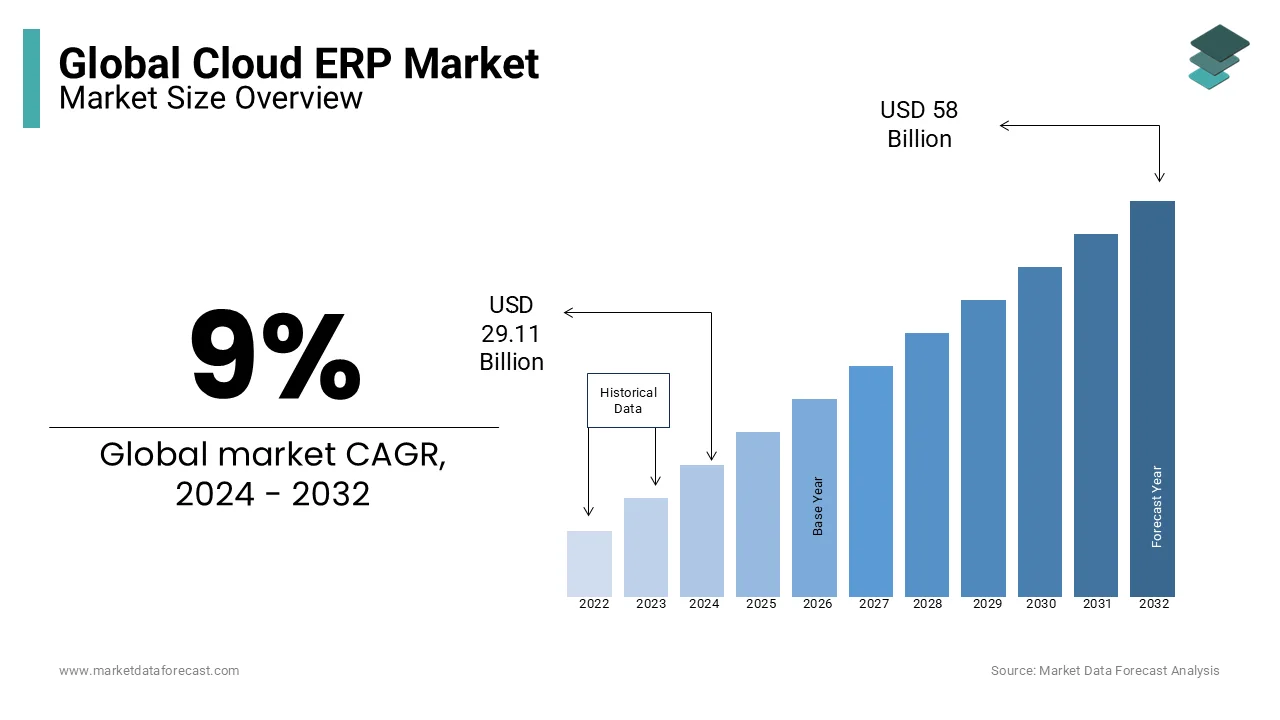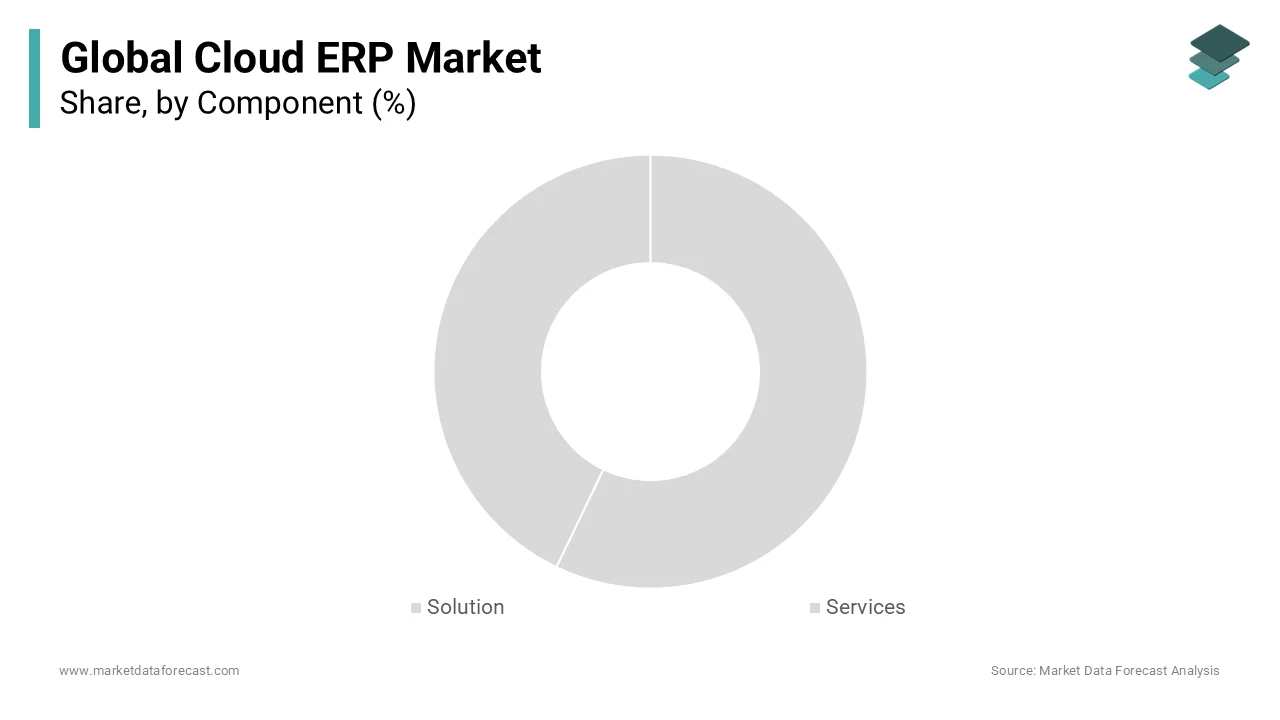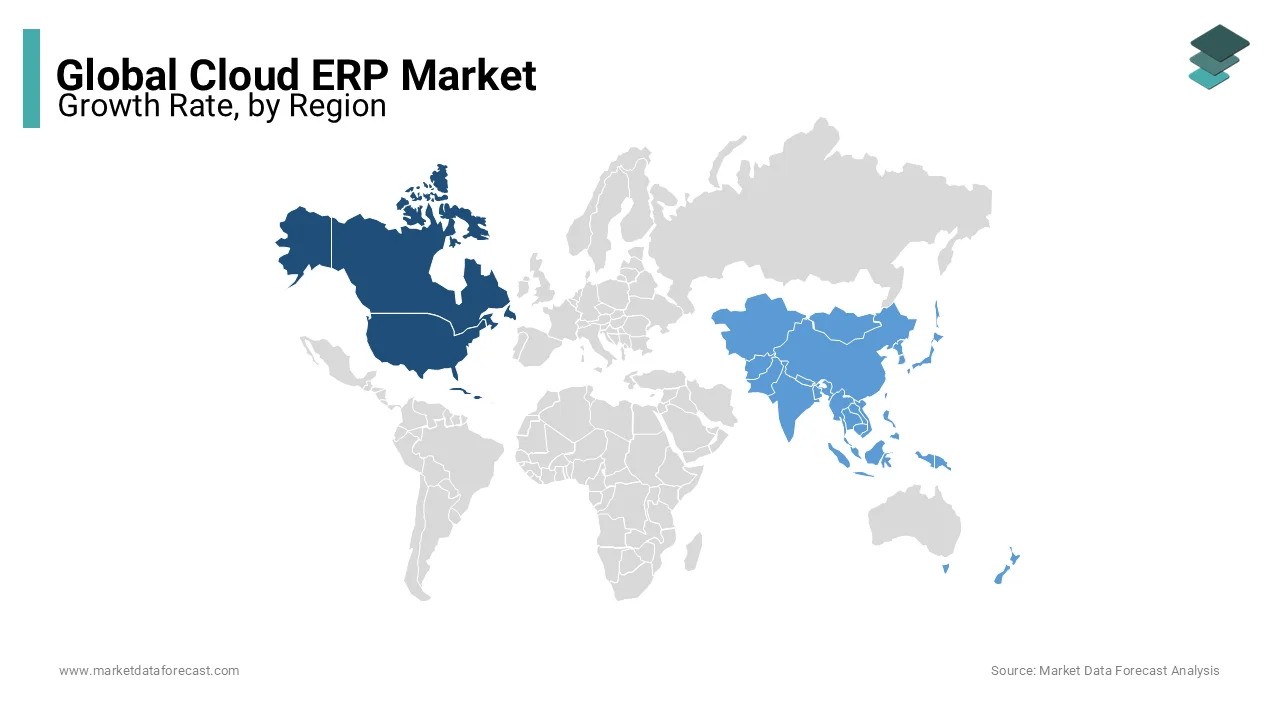Global Cloud ERP Market Size, Share, Trends, & Growth Forecast Report – Segmented By Component (Solution and Services), Business Function (Accounting and Finance, Sales and Marketing, Inventory and Order Management, and Human Capital Management), Vertical (Banking, Financial and Insurance (BFSI), Manufacturing, Public And Government, Aerospace and Defense, Education, Information Technology and Telecommunications, Healthcare, Retail, and others), Organization Size (SMEs and Large), & Region - Industry Forecast From 2024 to 2032
Global Cloud ERP Market Size (2024 to 2032)
The global cloud ERP market was worth USD 26.71 billion in 2023. The global market is determined to develop from USD 29.11 billion in 2024 to USD 58 billion by 2032, growing at a CAGR of 9% during the forecast period.

Current Scenario of the Global Cloud ERP Market
Cloud ERP or Cloud Enterprise Resource Planning refers to the use of cloud computing platforms and services to improve and streamline business operations. The introduction of these services has led to the transformation of processes for various organizations and companies. Known as one of the leading technologies in the modern world, cloud computing involves the use of the Internet to store shared computer records, documents, tools and records. The adoption of this technology has enabled companies to host their complete IT infrastructure on virtual platforms via remote data centres. Today, cloud ERP is used to manage human capital, finance and various other important aspects of a business.In the coming years, analysts predict that smart use of the ERP application in the cloud will reduce operating expenses. A key benefit of using these solutions will be the ability of organizations, businesses, and institutes to avoid purchasing servers and storage equipment, and thus reduce the costs of maintaining them. Despite the various advantages of using ERP solutions in the cloud, the technology has its many disadvantages. The downside to implementing ERP software is the issue of integrating legacy systems and enterprise ERP modules. The solutions designed to ensure this seamless transfer should soon open several new markets for the global cloud ERP market.
MARKET TRENDS
Tracking stocks and orders is essential for businesses to ensure the smooth production of products and goods. Manual processes and human intervention are important areas where errors can occur. Businesses are looking for a solution that will help them solve these problems. An ERP solution helps companies to solve these problems and improve the efficiency of the whole process.SMEs have a limited budget and workforce, making them vulnerable in the market. To stay competitive in the marketplace, companies are adopting a cloud ERP that will help them optimize business processes and cost benefits. Profitability is one of the main factors for SMEs, as they are price-sensitive in terms of adopting new solutions. These benefits of cloud ERP solutions encourage SMBs to aggressively adopt cloud ERP solutions.
MARKET DRIVERS
The increasing adoption of cloud services and mobile applications, as well as the increasing demand of small and medium-sized enterprises (SMEs) To achieve optimal efficiency and transparency of business processes, are the main factors driving the global ERP market in the cloud. The growing demand of SMEs and large companies from various industry sectors for hosted ERP services and solutions is further stimulating the growth of the cloud ERP market. The growing support from governments around the world for the advancement of IT infrastructure in enterprises is expected to stimulate demand for such solutions. The other crucial factor that is supposed to boost the global market is the plans of several enterprises to have extended storage facility at all times, along with a disaster recovery policy.
REPORT COVERAGE
|
REPORT METRIC |
DETAILS |
|
Market Size Available |
2023 to 2032 |
|
Base Year |
2023 |
|
Forecast Period |
2024 to 2032 |
|
CAGR |
9% |
|
Segments Covered |
By Component, Business Function, Organization Size, Vertical, and Region |
|
Various Analyses Covered |
Global, Regional & Country Level Analysis, Segment-Level Analysis, DROC, PESTLE Analysis, Porter’s Five Forces Analysis, Competitive Landscape, Analyst Overview on Investment Opportunities |
|
Regions Covered |
North America, Europe, APAC, Latin America, Middle East & Africa |
|
Market Leaders Profiled |
Oracle (United States), SAP (Germany), Microsoft (United States), Infor (United States), Unit4 (Netherlands), Workday (United States), Sage Software (United Kingdom), Epicor (United States), QAD Inc (United States), Plex Systems (United States), Acumatica (United States), Deltek (United States), Software Rootstock (United States), IQMS (United States) and Ramco Systems (India) and Others. |
SEGMENTAL ANALYSIS
Global Cloud ERP Market Analysis By Component

based on components in solutions and services. The professional services segment is further categorized as implementation, consulting, training and education, and support and maintenance.
Global Cloud ERP Market Analysis By Business Function
Based on the business function, the global market is divided into accounting and finance, sales and marketing, inventory and order management, and human capital management. By business function, the type of inventory and order management is likely to maintain the largest size of the market during the forecast period.
Global Cloud ERP Market Analysis By Organization Size
Depending on the size of the organization, the global cloud ERP market is segmented into small and medium-sized and large companies. The SMEs segment is determined to progress with a considerable CAGR over the calculated period.
Global Cloud ERP Market Analysis By Vertical
the global cloud ERP market is segmented into the banking, financial and insurance, manufacturing, public and public, aerospace and defense, education sectors, information technology and telecommunications, health care, retail, and others.
REGIONAL ANALYSIS

North America, trailed by Europe, is supposed to rule the worldwide market in the coming years. This is credited to the operations of leading cloud ERP providers and established services in these locales. Also, the early adoption of novel technologies in developed economies like the United States, the United Kingdom, and Canada are majorly supporting growth in North America and Europe. However, Asia-Pacific is determined to progress as a rapidly emerging vicinity in the global cloud ERP market due to the increasing adoption of these technologies by several large and small and medium-sized enterprises.
KEY PLAYERS IN THE GLOBAL CLOUD ERP MARKET
- Oracle (United States)
- SAP (Germany)
- Microsoft (United States)
- Infor (United States)
- Unit4 (Netherlands)
- Workday (United States)
- Sage Software (United Kingdom)
- Epicor (United States)
- QAD Inc (United States)
- Plex Systems (United States)
- Acumatica (United States)
- Deltek (United States)
- Software Rootstock (United States)
- IQMS (United States)
- Ramco Systems (India)
RECENT HAPPENINGS IN THE GLOBAL CLOUD ERP MARKET
-
In April 2019, Oracle has recently upgraded its NetSuite portfolio with the implementation of the planning and budgeting service. The new service would integrate with NetSuite, allowing companies to analyse performance in real time.
-
In March 2019, Oracle integrated novel artificial intelligence capabilities to its cloud ERP portfolio. New features include an expense report assistant and a digital project management assistant.
DETAILED SEGMENTATION OF THE GLOBAL CLOUD ERP MARKET INCLUDED IN THIS REPORT
This research report on the global cloud ERP market has been segmented and sub-segmented based on the component, business function, organization size, vertical, and region.
By Component
- Solution
- Services
By Business Function
- Accounting and Finance
- Sales and Marketing
- Inventory and Order Management
- Human Capital Management
By Organization Size
- Banking, Financial and Insurance (BFSI)
- Manufacturing
- Public And Government
- Aerospace and Defense
- Education
- Information Technology and Telecommunications
- Retail
- Healthcare
By Vertical
- SMEs
- large
By Region
- North America
- Asia-Pacific
- Europe
- Latin America
- Middle East and Africa
Frequently Asked Questions
How secure are Cloud ERP systems, especially in the wake of increasing cyber threats globally?
Cloud ERP providers prioritize security measures to safeguard sensitive data. They employ encryption techniques, multi-factor authentication, regular security audits, and compliance with industry standards such as GDPR and SOC 2 to ensure data protection. Additionally, many providers offer dedicated cybersecurity services to address evolving threats.
How does Cloud ERP support multinational companies in managing operations across multiple locations and regulatory environments?
Cloud ERP systems provide centralized visibility and control over global operations by enabling real-time data access, standardizing processes, and streamlining compliance with regional regulations. Features like multi-currency and multi-language support, along with localization capabilities, empower multinational companies to efficiently manage diverse operations while ensuring consistency and compliance.
What role does artificial intelligence (AI) and machine learning (ML) play in enhancing the capabilities of Cloud ERP solutions for global enterprises?
AI and ML technologies embedded within Cloud ERP systems enable predictive analytics, automation of repetitive tasks, intelligent decision-making, and proactive insights generation. This enhances operational efficiency, accelerates decision-making processes, and enables global enterprises to adapt quickly to changing market dynamics and customer demands.
What are the future trends expected to shape the evolution of the Cloud ERP market globally?
Future trends in the Cloud ERP market include the increasing adoption of Industry 4.0 technologies like IoT and blockchain, greater emphasis on vertical-specific ERP solutions, the rise of hybrid deployment models combining cloud and on-premise functionalities, and continued innovation in areas such as AI-driven automation and predictive analytics to meet the evolving needs of global enterprises.
Related Reports
Access the study in MULTIPLE FORMATS
Purchase options starting from $ 2500
Didn’t find what you’re looking for?
TALK TO OUR ANALYST TEAM
Need something within your budget?
NO WORRIES! WE GOT YOU COVERED!
Call us on: +1 888 702 9696 (U.S Toll Free)
Write to us: [email protected]